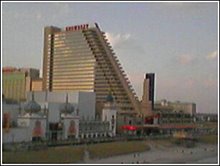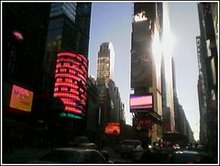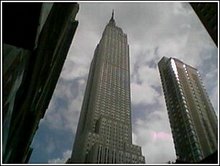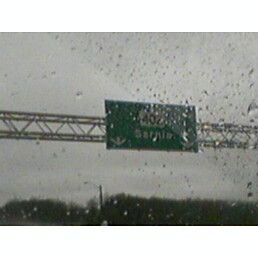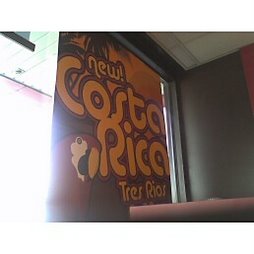Please bear with a nerdy CALLOO CALLAY...WKRP in Cincinnati is out on DVD.
Nearly thirty years after the fact, Cincinnati's favorite radio station is still among the greatest television comedies ever broadcast. Part of the appeal lies in the fact that WKRP wasn't on the air long enough to get stale or become self-parodying. After 100 episodes, it was gone.
For the non-informed, it was the show Newsradio wanted to be, and more often than not approached for quality, despite the malign entity that is Andy Dick. For those who have an appreciation of the series in its original run on CBS, the only loss is the replacement of the original crappy seventies name-brand rock with generic crappy seventies-style instrumental cuts.
And Boooooger lives on in the collection. Somehow, Dr. Johnny Fever losing his gig in California for saying booger on the air seems quaint in the era of Don Imus referring to the Rutgers Women's Basketball team as "nappy-headed ho's." Indeed, Fever's second firing in California as a result of uttering a phrase commonly associated with being master of one's domain, in Seinfeld-speak, is absolutely archaic compared with Howard Stern's daily lesbian midget love fest on satellite radio.
Don Imus is no Johnny Fever. Johnny Fever had class, and style, and was not so self-absorbed as to believe himself to be a kingmaker and great wit. The voice of Johnny Fever was passionate about music, and confirmed in the faith that music and radio were an equalizer for the powerless and disenfranchised.
It was a cynicism rooted in a living memory of music pulling a humble trucker from Tupelo into the national spotlight. The trucker's fame came from combining the voices of disenfranchised people with a face that 1950s television could embrace. He empowered acceptance of a movement that no American, nowhere in America, should be deprived of any right, provided that said American lived up to the responsibilities that go with the privilege.
Fast forward thirty years to see Imus strip the dignity from the young ladies from Rutgers, upon a significant achievement in competition, and then go on the air with a bigger cretin, Reverend Al Sharpton, to seek his reconciliation.
On one hand, it was funny. Not funny in the way of WKRP but funny in an Attack of the Killer Tomatoes vein, to wit, an absurd premise with an entirely predictable script. One knew that Sharpton was not going to find pardon for Imus. Sharpton was watching Imus twist in the wind for the sheer diversion of it.
In seventies argot, they were two turkeys and it was Thanksgiving in April.
It seems a shame that no one tried to see if they could fly. Reverend Al Sharpton is not Venus Flytrap, either. He doesn't seem to share Venus' goldenly eloquent mastery of grammar and vocabulary. Venus persevered, where Sharpton requires bogus racism to achieve notoriety and justify his presence.
Suddenly, your Wandering Gentile feels waves of nostalgia for 1978. If pills won't cure it, the memory of how bad the cars were will.
There is a great feeling when reconnecting with art well made. Sometimes the art doesn't measure up- Miami Vice seems horribly stuck in its era when seen today, for example. But somtimes something endures and seems as fresh as the day it was made. Huckleberry Finn works 130 years later; Casablanca is great after 65 years; and happily, the words "as God is my witness, I thought turkeys could fly," hit just as well 29 years after they came across my black-and-white television in East Point, Georgia, for the first time.
What was an "Imus," anyway?
29 April 2007
06 April 2007
Minuteman Patriot!
Forrest B. Smallwood came to the attention of the Wandering Gentile through his service as a security guard to the Lone Star Candies (Fudge Packing Division) plant in Tarado (tuh-RAY-doe), Texas. An engaging conversationalist, he shared some extremely enlightened opinions regarding American sovereignty and the threat posed by desperate, disposessed people.
I accepted a ride to Tarado's finest, and only, quick service eatery, the Dairy Duchess at exit 3 on I-36. It is possible to see the Dairy Princess from Lone Star Candies, but it is also possible to see Lubbock clearly from Midland. Texas has a lot of flat places.
Smallwood's car was a rusty blue '92 Lumina with a 2005 registration from Big Beaver County, Ohio; a Rick Case Cleveland dealer badge; and a Tancredo for President bumper sticker.
"They're coming over the border and riding straight up this road toward Wichita Falls," Smallwood said. "The Minutemen are the last, best line of defense of American freedom."
I positioned myself in such a way as to avoid a DVD case featuring the images of late '90s boy band, the Backdoor Brothers, and a some sort of foreign substance that prevented the hard plastic cover from sliding on the velour.
"They're bringing diseases, and drugs. Illegal aliens are taking jobs and driving down wages for middle class people like us. The drain they put on our social services comes out of our pockets!
"My tax dollars are paying to support people who are breaking the law!" Smallwood eased the Chevy up to 70 in the 45 zone. He was near tears.
At no point was the idea of the price of vegetables tripling mentioned, but it seemed that Mr. Smallwood, standing five-three and a robust 310 pounds, had little use for food that did not quadruple the recommended yearly allowance for Lard. There was also no room for the idea that we are near full employment with several million undocumented people in the labor stream.
"So what would you propose that we do?" I asked.
"Seal the border and send them all back. Preferably using a slingshot. You know the administration is trying to give up our sovereignty by merging the United States with Canada and Mexico? They're going to change our currency to the Amero."
He seemed to be referring to a Bush administration proposal to work with Canada and Mexico to find common ground in law to get some consistency and reciprocity between jurisdictions.
"You don't seem to have a Texas accent," I said.
"Those big corporations who want amnesty for illegal aliens packed up all of the jobs back in Cleveland and sent them to Mexico for cheap labor."
Somehow, if all of these jobs were in Mexico, it would seem that there would be no motivation to leave, at least to me. I did not share this opinion. Having visited Cleveland, I also supposed that the undesirable climate and high taxation and state regulation in Ohio might have had a little something to do with the situation as well.
Of course, I come from Atlanta, where a lot of operations moved from heavily regulated, highly taxed states with cruddy climates, so I might share some complicity as well.
"I'm going to duck into my house for just a second. I got to make a little withdrawal from the bank of Maxwell House."
His house was a Champion singlewide manufactured home. In fact, a tax sticker from Terco County, Texas, was issued in 1973, thus it was old enough to still be called a trailer. Inside was mediterranean style furniture, harvest gold appliances, and orange cut-pile carpeting. There was another boy band video with a strange substance on the cover.
"Where's your daughter?" I asked.
Smallwood pulled a ten-dollar bill out of the Maxwell House can in the freezer. Icily, he replied "I don't have a daughter."
"Oh." I had an idea what the substance on the boy band video covers might be, but the logical answer was too disgusting to be contemplated. One wall featured eight-by-ten glossies of Lou Dobbs, Michael Savage, and Congressman Brian Bilbray. They seemed to be autographed by the same pen, in the same handwriting, with the same spelling errors.
"So, you went to school in Cleveland?" I asked.
"The schools in Cleveland were filled with the same liberal agenda. Algebra, chemistry, term papers. But they won't teach Illegal Mexican Aliens to talk English! So I left them to live in the cesspool they created."
"Were there many illegals in Cleveland?"
Smallwood became vehement. "You bet! They were from Fajardo and Guayama and Aguadilla."
I smiled. Not only were the places not even in Mexico, the people he was describing were United States Citizens from Puerto Rico. "Let's get over to the Dairy Duchess and get ourselves some chili dogs. And a Moderate Snow Shower frozen dessert!"
The conversation ends there, as there was a minor electrical system meltdown in the Lumina, and he chose to wait for a friend from the Terco County, Texas, Minuteman Militia intead of returning to the plant with a moonlighting electrical engineer from Tegucigalpa.
EPILOGUE
Forrest B. Smallwood died on September 6, 2006. He had been working on a fence to prevent migrants from New Mexico from entering Texas when he encountered a trucker evading the scale in Mulehead City, and immediately accused him of being an Illegal Mexican Alien.
The driver, Raymond "Moose" Thunder Cloud, of Tahlequah, Oklahoma, took high offense to the idea that he was in some fashion less entitled to be in the United States than Mr. Smallwood.
Mr. Thunder Cloud, in a sworn statement released by Terco County Constable Diego Velasquez, defended himself from what he believed to be grave and imminent danger from what he presumed to be a highjacker on FM 13490, three miles west of Tarado. The Texas DPS Crime Scene investigator found the shards of a blue exchange pallet consistent with the severe pummelling of Mr. Smallwood, and a sudden storm washed Mr. Smallwood's remains into a nearby culvert.
There was no funeral, no body, nor were there any survivors.
I accepted a ride to Tarado's finest, and only, quick service eatery, the Dairy Duchess at exit 3 on I-36. It is possible to see the Dairy Princess from Lone Star Candies, but it is also possible to see Lubbock clearly from Midland. Texas has a lot of flat places.
Smallwood's car was a rusty blue '92 Lumina with a 2005 registration from Big Beaver County, Ohio; a Rick Case Cleveland dealer badge; and a Tancredo for President bumper sticker.
"They're coming over the border and riding straight up this road toward Wichita Falls," Smallwood said. "The Minutemen are the last, best line of defense of American freedom."
I positioned myself in such a way as to avoid a DVD case featuring the images of late '90s boy band, the Backdoor Brothers, and a some sort of foreign substance that prevented the hard plastic cover from sliding on the velour.
"They're bringing diseases, and drugs. Illegal aliens are taking jobs and driving down wages for middle class people like us. The drain they put on our social services comes out of our pockets!
"My tax dollars are paying to support people who are breaking the law!" Smallwood eased the Chevy up to 70 in the 45 zone. He was near tears.
At no point was the idea of the price of vegetables tripling mentioned, but it seemed that Mr. Smallwood, standing five-three and a robust 310 pounds, had little use for food that did not quadruple the recommended yearly allowance for Lard. There was also no room for the idea that we are near full employment with several million undocumented people in the labor stream.
"So what would you propose that we do?" I asked.
"Seal the border and send them all back. Preferably using a slingshot. You know the administration is trying to give up our sovereignty by merging the United States with Canada and Mexico? They're going to change our currency to the Amero."
He seemed to be referring to a Bush administration proposal to work with Canada and Mexico to find common ground in law to get some consistency and reciprocity between jurisdictions.
"You don't seem to have a Texas accent," I said.
"Those big corporations who want amnesty for illegal aliens packed up all of the jobs back in Cleveland and sent them to Mexico for cheap labor."
Somehow, if all of these jobs were in Mexico, it would seem that there would be no motivation to leave, at least to me. I did not share this opinion. Having visited Cleveland, I also supposed that the undesirable climate and high taxation and state regulation in Ohio might have had a little something to do with the situation as well.
Of course, I come from Atlanta, where a lot of operations moved from heavily regulated, highly taxed states with cruddy climates, so I might share some complicity as well.
"I'm going to duck into my house for just a second. I got to make a little withdrawal from the bank of Maxwell House."
His house was a Champion singlewide manufactured home. In fact, a tax sticker from Terco County, Texas, was issued in 1973, thus it was old enough to still be called a trailer. Inside was mediterranean style furniture, harvest gold appliances, and orange cut-pile carpeting. There was another boy band video with a strange substance on the cover.
"Where's your daughter?" I asked.
Smallwood pulled a ten-dollar bill out of the Maxwell House can in the freezer. Icily, he replied "I don't have a daughter."
"Oh." I had an idea what the substance on the boy band video covers might be, but the logical answer was too disgusting to be contemplated. One wall featured eight-by-ten glossies of Lou Dobbs, Michael Savage, and Congressman Brian Bilbray. They seemed to be autographed by the same pen, in the same handwriting, with the same spelling errors.
"So, you went to school in Cleveland?" I asked.
"The schools in Cleveland were filled with the same liberal agenda. Algebra, chemistry, term papers. But they won't teach Illegal Mexican Aliens to talk English! So I left them to live in the cesspool they created."
"Were there many illegals in Cleveland?"
Smallwood became vehement. "You bet! They were from Fajardo and Guayama and Aguadilla."
I smiled. Not only were the places not even in Mexico, the people he was describing were United States Citizens from Puerto Rico. "Let's get over to the Dairy Duchess and get ourselves some chili dogs. And a Moderate Snow Shower frozen dessert!"
The conversation ends there, as there was a minor electrical system meltdown in the Lumina, and he chose to wait for a friend from the Terco County, Texas, Minuteman Militia intead of returning to the plant with a moonlighting electrical engineer from Tegucigalpa.
EPILOGUE
Forrest B. Smallwood died on September 6, 2006. He had been working on a fence to prevent migrants from New Mexico from entering Texas when he encountered a trucker evading the scale in Mulehead City, and immediately accused him of being an Illegal Mexican Alien.
The driver, Raymond "Moose" Thunder Cloud, of Tahlequah, Oklahoma, took high offense to the idea that he was in some fashion less entitled to be in the United States than Mr. Smallwood.
Mr. Thunder Cloud, in a sworn statement released by Terco County Constable Diego Velasquez, defended himself from what he believed to be grave and imminent danger from what he presumed to be a highjacker on FM 13490, three miles west of Tarado. The Texas DPS Crime Scene investigator found the shards of a blue exchange pallet consistent with the severe pummelling of Mr. Smallwood, and a sudden storm washed Mr. Smallwood's remains into a nearby culvert.
There was no funeral, no body, nor were there any survivors.
Subscribe to:
Posts (Atom)

